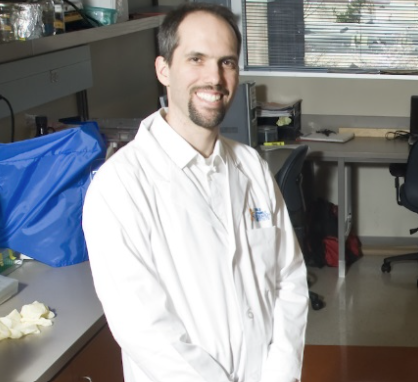
Dr. Pascal Lavoie
Researcher, Bronchopulmonary dysplasia
Dr. Pascal Lavoie is a clinician-scientist, staff neonatologist at the Children's & Women's Health Centre and principal research investigator at the BC Children's Hospital Research Institute.
Dr. Lavoie divides his time between the BC Children's Hospital Research Institute and the Neonatal Intensive Care Unit at BC Women’s Hospital & Health Centre. His research focuses on understanding the development of the immune system in humans before and at birth, and how to use this knowledge to prevent diseases in this age group.
Why do premature babies develop lung problems?
Lungs in premature babies don’t develop as fast as the rest of the body when they are born too early. This leaves them more susceptible to Bronchopulmonary dysplasia (BPD), which is a serious form of lung disease. Each year in Canada, more than 3,000 premature babies will develop BPD in the first weeks of life. Thirty years ago, these babies would not have survived. Today, the specialized care that is available for babies in Neonatal Intensive Care Units (NICU) gives them a much better chance, but there is still a long way to go.
What implications does BPD have for a premature baby’s health?
In the short term (after two to three weeks) breathing can become more laboured and they may need to be put on a ventilator, which can make the BPD worse. The condition can last for several weeks. It is very stressful for parents as the babies are very susceptible to respiratory infections, which may result in re-admittance to the NICU. Some children may have to remain on a ventilator for the first few years of life. By the time they are teenagers, they will have grown out of it, but they will have reduced lung function, a little bit like a heavy smoker. One concern is that, once they reach their fifties, they may develop another serious lung condition called Chronic Obstructive Pulmonary Disease (COPD).
What led you to look at genetics for possible treatment solutions?
I had been in the field of neonatology for fifteen years, and it looked to me like some babies were way sicker than others. Previous studies done here in BC and also at Yale showed there was a strong genetic connection to BPD. It opened up a whole new field. Right now, the treatment for BPD is steroids, which can have serious side effects, including potentially impacting brain development. But in life or death situations, we have to use them. We are at a point where we need all the rocks to be flipped to find new treatment options. We have a huge interest in trying to predict which babies will get BPD.
How will you go about this research?
With the help of a previous grant from BC Lung Association, we have collected DNA from a large cohort from Vancouver, Edmonton and Finland from two separate time periods. Genetic experts at the Child & Family Research Institute are ready to start analyzing a few million variable points in each sample.
How will this research help?
There are two ways genetic studies can help. First, we can quantify the risk of disease, which will help us test new treatment approaches. And second, with genetic research, sometimes you identify genes you had no idea had a link to what you are studying. If we find something like a gene or a specific genetic marker, that’s really exciting. If we don’t, then we have learned lots.
The BC Lung Foundation grants a million dollars annually to physicians and scientists doing research in British Columbia and is a funder of Dr. Lavoie's research.